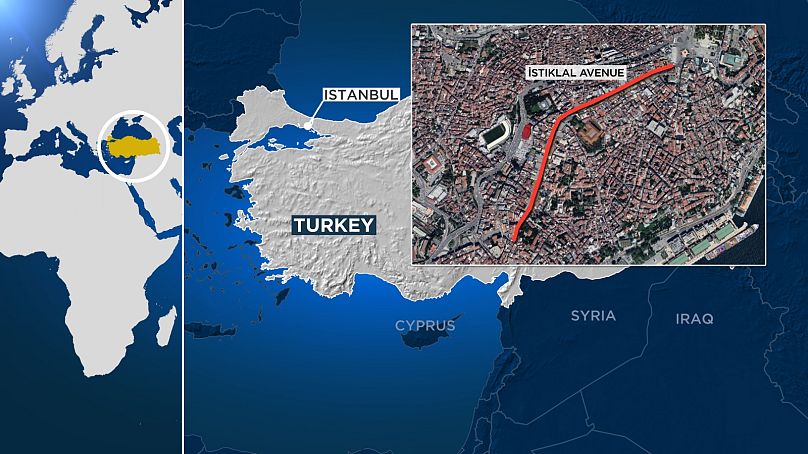Turkish authorities have put a ban on media outlets broadcasting or publishing images from the scene of the incident.
A bomb rocked a major pedestrian avenue in the heart of Istanbul on Sunday, killing six people, wounding several dozen and sending people fleeing the fiery explosion.
 ADVERTISEMENT
ADVERTISEMENT
 ADVERTISEMENT
ADVERTISEMENT
Emergency vehicles rushed to the scene on Istiklal Avenue, a popular thoroughfare lined with shops and restaurants that leads to the iconic Taksim Square. In one video posted online, a loud bang could be heard and a flash seen as pedestrians turned and ran away.
Turkish President Recep Tayyip Erdogan called the blast a “treacherous attack” and said its perpetrators would be punished.
He did not say who was behind the attack but said it had the “smell of terror” without offering details and also adding that was not certain yet. The president said investigations were ongoing by the police and the governor’s office, including reviewing footage of the area.
Erdogan said six people were killed. Vice President Fuat Oktay later updated the wounded toll to 81, with two in serious condition, and also said it appeared to be a terrorist attack.
Numerous foreign governments offered their condolences, including neighboring Greece with which relations are tense. Prime Minister Kyriakos Mitsotakis said he was “shocked and saddened by the news of the heinous attack.”
Turkey was hit by a string of bombings between 2015 and 2017 that left more than 500 civilians and security personnel dead. Some of the attacks were perpetrated by the Islamic State group, while others were executed by Kurdish militants who have led a decadeslong insurgency against the Turkish state for increased autonomy or independence.
Turkey has been fighting the militants -- known as the PKK and considered a terrorist organization by Turkey, the United States and the European Union -- in the country's southeast for years.
Following the string of attacks, Turkey launched cross-border military operations into Syria and northern Iraq against Kurdish militants, while also cracking down on Kurdish politicians, journalists and activists at home through broad terror laws that critics say are a way to silence dissent.
Turkey’s media watchdog imposed temporary restrictions on reporting on Sunday's explosion -- a move that bans the use of close-up videos and photos of the blast and its aftermath. The Supreme Council of Radio and Television has imposed similar bans in the past, following attacks and accidents.
Access to some content on Twitter and other social media sites, such as videos, was limited.











